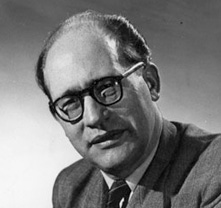René Delacroix (1900-1976)
René Delacroix was a part of Catholic film circles in France. He began his career in the early 1930s with Abbé A. Vachet’s FiatFilm, for which he made a few films. When Renaissance Films Distribution was founded in 1944 and called on French personnel to set up its studios and launch production, Delacroix, Vachet and several technicians from FiatFilm signed up. In 1947, Delacroix founded the Union catholique du cinéma. Le gros Bill (1949), the first film he made in Quebec, established his name as a film director in Quebec cinema. It featured picturesque rural families and a typical homespun story. That same year, Delacroix returned to France to make Docteur Louise, a co-production about the anti-abortion movement. He was called back to Quebec for a film produced by J.A. DeSève, Le rossignol et les cloches, which was built around the popularity of a young singer with a golden voice. The following year, he worked with Gratien Gélinas, directing the adaptation of his successful play Tit-coq (1952). This was a fruitful collaboration, but unfortunately the only one between the two. The same cannot be said of Delacroix’s last film in Quebec, the melodramatic Coeur de maman (1953). Delacroix returned to France, where his career did not survive the 1950s.
- Themes
- 16 mm
- Native Peoples in the Cinema
- The Talkies Arrive
- Television
- French Canadians at the NFB
- Censorship
- Religious Cinema
- Settling the Land
- Film and French language
- Cinema and Religion
- 16mm Exhibition Circuits
- Quebec’s French Cousins in its Cinema
- Colour
- Film Distributors and Exhibitors
- Hollywood in Quebec
- Maria Chapdelaine
- Quebecers in Hollywood
- Radio and Cinema
- The Massey Report
- Film Magazines
- Second World War
- Organisations
- Biographies
- Juliette Béliveau
- Jean-Yves Bigras
- Léo Choquette
- Fifi D'Orsay
- René Delacroix
- J.A. DeSève
- George Ganetakos
- Pauline Garon
- Gratien Gélinas
- Nicole Germain
- John Grierson
- Paul Gury
- Richard Jarvis
- Paul L'Anglais
- Louis-Roger Lafleur
- Herménégilde Lavoie
- Ovila Légaré
- Guy Mauffette
- Joseph Morin
- Fedor Ozep
- Jean Palardy
- Vincent Paquette
- Jean-Marie Poitevin
- Maurice Proulx
- Roger Racine
- Norma Shearer
- Gordon Sparling
- Albert Tessier
